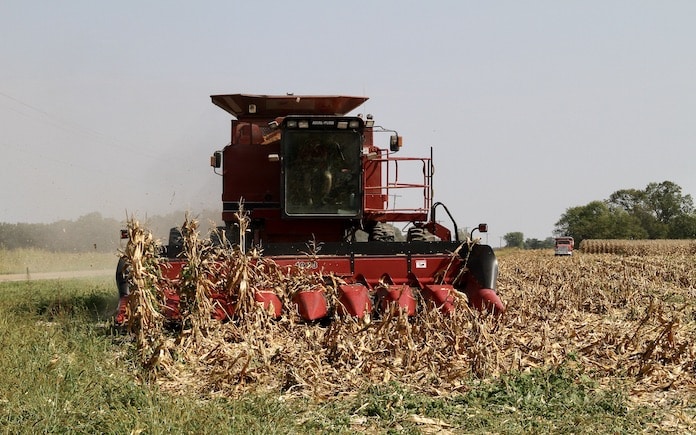Drought tempers fall harvest

Farmers throughout Monroe and Randolph counties have recently been busy with the fall harvest as they take advantage of the dry weather and get outside, though lack of rain over the summer appears to have severely impacted crops.
This harvest, which has mostly involved corn but has also seen some soybeans come out of the field, has been mixed but generally positive, according to Gateway FS Grain Division Manager Adam Parker.
The biggest factor in the harvest, he said, seems to be where the rain fell over the past few months.
“Pretty variable yields so far just given where the rain happened or didn’t happen this summer,” Parker said. “All in all, I’m hearing a lot of ‘better than expected.’ I think us starting to get some rain the middle of July… If you had asked me around the Fourth of July what the prospects looked like, it looked pretty bleak, and then we started catching some rain.”
As far as numbers go, Parker said average corn yields look to be roughly 150-170 bushels per acre, down about 10-15 percent from last year.
The ongoing soybean harvest has similarly been down, with yields standing at about 50-60 bushels per acre.
Parker summarized this yield as “better than what was expected heading into harvest” considering the notable drought the crops had to contend with through the summer.
He also spoke about the prospective profit for local farmers, saying grain prices are down along with yields.
“The prices for grain are, I would say, down from the prior year,” Parker said. “You kinda combine a smaller yielding crop this fall with prices that essentially dropped over the past few months. We’re probably below where we were price-wise a year ago with a smaller crop.”
Parker also noted the low levels of the Mississippi River – which are, perhaps, not as striking as last year though they are still low – and the impact that will have for farmers as barges are only able to carry about two-thirds of a typical load.
Reduced loads mean greater shipping costs which hurt the prices farmers are able to get.
Additionally, he described the role global competition plays in prices for local farmers.
According to Parker, South America has had a tremendous yield for corn and soybeans recently. This abundance has gone on to reduce demand in U.S. grain from overseas importers like China.
Local farmers also shared their perspective on the ongoing harvest.
Monroe County Farm Bureau President Bruce Brinkman, whose acreage is largely in the bottoms, was rather positive about the lack of rain as it has eased the harvest, though it’s hardly been a boon elsewhere.
“We had a lack of rain, so the corn harvest went pretty quick,” Brinkman said. “With the bushels, it was really all over the board. There were some fields that were phenomenal and then there’s other fields that were just horrible. I guess another typical year, from really good to really poor. The poor side was much more poor than it would’ve normally been.”
Brinkman explained he was unable to make his average this year and seems to be down about 20 percent.
Given the rather low yield, he emphasized how he might well end up making a claim on his crop insurance as the harvest concludes in the coming weeks.
Brinkman spoke about a variety of factors likely to impact his overall profits this year, noting the high freight costs as grain is shipped out on the Mississippi.
“The barges are not getting loaded all the way like they normally would, much like they were last year,” Brinkman said. “I think they’re only running like an eight foot draft, nine at the very most, but the river is way, way down. It’s below zero, so freight costs are going to be astronomical for heading to the port. That’s gonna hurt the basis also.”
Basis is the difference between the local cash price and the futures market price. A low basis means the current price is higher than the expected price, and farmers should sell. A high basis means the price is expected to grow, and farmers should wait to sell if possible.
Brinkman also discussed balance of harvest revenue with input costs dealt with several months ago.
“The input costs were pretty high this spring as far as seed, fertilizer, chemicals. That was all pretty high,” Brinkman said. “And now the price taking the nosedive that it did… It’s gonna be a pretty slim year when it comes to profit.”
Brinkman suggested his gross income could be down about 30 percent this year. As he said, that’s not a position that will break him, though it does leave him with less pocket money, and he likely won’t be making any big equipment purchases for a while.
Brinkman also noted that as he also raises livestock, he at least gets to enjoy the benefit of lower corn prices on the other side of the market.
Further south, Illinois Farm Bureau President Rich Guebert of Red Bud gave a slightly more positive description of how he and his neighbors have been handling the harvest.
“We’re happy with the yields so far,” Guebert said. “We’re running just a little bit over the average, so we’re happy. With how dry it’s been, it could be worse. I think in Randolph County where I’m at, we’re probably, I’m guessing, between 40 and 50 percent done with corn, and there’s a few beans being cut.”
He summarized the harvest by saying Randolph County farmers were “pleasantly surprised.”
Guebert acknowledged, however, that folks in the bottoms were far less lucky – though he pointed to soil as the key deciding factor.
“I know I saw some that have been harvesting in the bottoms and yields are all over the board from 0 to 100, and it all depends on the soil,” Guebert said. “You’ve got good soil, deep soil, the crop is looking pretty deep. But if you’ve got thin soil, it’s a real big difference, and it’s burned off, not as good.”
In his position with the Illinois Farm Bureau, Guebert also said results are mixed statewide, with different counties and regions either getting his pleasant surprise or some disappointment.
While yields have been decent for him, Guebert did express frustration with grain prices.
“Disappointed with what the price is compared to what our input costs are,” Guebert said. “It’s gonna be pretty tough this year.”








